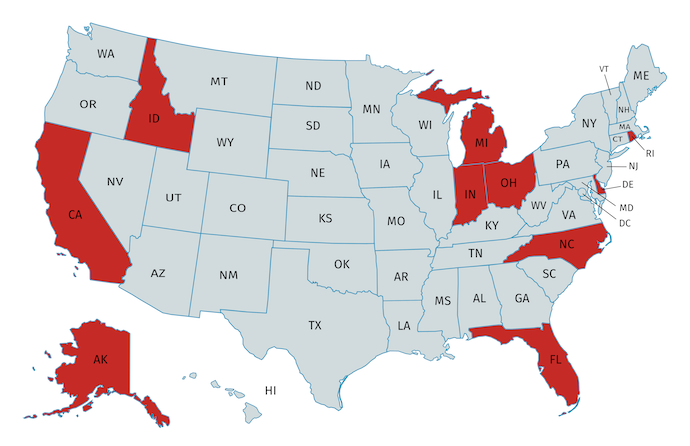DELTA FOCUS Stories
About DELTA FOCUS
The DELTA FOCUS (Domestic Violence Prevention Enhancement and Leadership Through Alliances, Focusing on Outcomes for Communities United with States) program supported domestic violence coalitions to identify, implement, and evaluate programs that are theoretically or empirically linked to reducing IPV, or decreasing risk factors or increasing protective factors for Intimate Partner Violence (IPV).
DELTA FOCUS grantees worked to prevent IPV at the national, state and local levels by implementing strategies to change the environments and conditions in which people live, work and play. To do this, grantees addressed economic and social policies, processes, and norms that shape the lives of individuals and communities. This involved implementing strategies that impact issues such as education, employment, reducing gender bias, and more.
Each grantee supported one or two coordinated community response teams (CCRs) to implement strategies at the local level. CCRs are local coalitions comprised of members from a variety of sectors (e.g., health care providers, the education community, faith-based communities, the criminal justice system, etc) engaged in IPV prevention. Sixteen CCRs were supported by DELTA FOCUS.
Map Showing the 10 CDC Funded State Domestic Violence Coalitions
DELTA FOCUS Stories
The coalitions learned important lessons along their journey! Some lessons are specific to one type of approach while some are more broadly applicable for implementing and evaluating community-based approaches. The goal of sharing these stories is for others in the violence prevention field to benefit from this collective learning. This includes learning more about existing field-based programs and practices, discovering what worked or did not work in implementation, and considering how to approach evaluation or develop a more rigorous evaluation than was possible for the DELTA FOCUS domestic violence coalitions.
Story Themes
For each theme, you will find: 1) a story summary, 2) a full printable story, 3) key lessons learned and highlighted strategies, 4) tools for adaptation, 5) highlighted projects, and 6) related resources from DELTA FOCUS grantees.
Please note: Subscribe to our newsletter for updates as new stories are released!
- Engaging Youth in IPV Prevention
- Engaging Men and Boys as Intimate Partner Violence Prevention Allies
- Policy-Based Prevention Approaches
- Trauma-Informed Community Building
- Creating Safe Spaces in Communities
- Building Partnerships & Coalitions
- School Based IPV Prevention
Overarching Lessons Learned
In addition to the key lessons shared in each story theme, coalitions reflected on their larger points of learning from the DELTA FOCUS experience.
-
Prevention work is broad and expansive.
We must invest in efforts to engage in community-level work to build community cohesion as part of our prevention strategy. – Lucy Rios, RICADV
The DELTA FOCUS project has influenced the way we understand prevention needs to happen across the continuum, including economic justice work as a prevention approach in the broader community. We now understand workforce development as an important component of our prevention efforts. – Lauren Camphausen, DCADV
Throughout the process, we noticed that work started looking less and less like what we would traditionally define as domestic violence prevention. Work shifted into “how can we engage with other existing systems to make sure that people have access to the resources they need and want?” It was about broadening the settings and systems we were working within. – Dena Fulton, NCCADV
-
Prevention work must be integrated into all that we do.
Primary prevention work can’t exist in an agency silo – it works best when it’s integrated and institutionalized across the organization. Each department has a critical role to play in prevention! – Lucy Rios, RICADV
-
Community partnerships are critical to reaching our prevention goals.
Partnering across human service sectors (addiction, mental health, etc.) and with local businesses adds value to all of our work. – Rebecca Cline, ODVN (For tips on engaging new partners, see our Engagement section.)
Our prevention work is an effort to change the structures in society that a) make life really hard for survivors or b) make domestic violence possible in the first place. We need to look beyond our domestic violence service system to accomplish this. – Dena Fulton, NCCADV
To create sustainable and meaningful partnerships, we must prioritize organizational relationships over individual relationships. – Emil Rudicell, FCADV
One of the unique aspects of this work was the purposeful inclusion of marginalized voices at all levels of the project. By being persistent in incorporating as many different voices as possible, we were left with rich, thorough, messages, policies, practices, and procedures. Part of this meant that we had to be comfortable with the fact that including as many people as possible takes time. Maintaining and building relationships was essential to this project. Giving time to build new relationships and foster existing relationships before major deliverables were due was key. – MCEDSV
-
Prevention can and must be trauma-informed.
We have come to learn the importance of trauma-informed prevention, which represents a shift towards acknowledging community and historical trauma. For example, in our bystander engagement work, we must understand how the history of trauma in communities impacts their bystanding behavior. – Lauren Camphausen, DCADV
-
Effective changes to policy and practice must include voices at all levels.
We were able to see changes happen when the communications flowed in both directions – from the state level, to the district, to the classroom, and back from the classroom, to the district, to the state. – Emil Rudicell, FCADV
-
Prevention work is both challenging and fundamentally just.
It requires intentional leadership to center those who are most impacted in this work. It can feel overwhelming, but can also fuel your passion for change.
Prevention requires us to shift from a movement based on sharing information to one that shifts power. Building a strategy around social change – to make safety the default for all communities, and to help people understand how systems perpetuate oppression and violence – is very challenging work. – Colleen Yeakle, ICADV
About the Grantees
Click on the links below to learn more about the prevention work of each DELTA FOCUS funded coalition.
- Alaska Network to End Domestic Violence
- California Partnership to End Domestic Violence
- Delaware Coalition Against Domestic Violence
- Florida Coalition Against Domestic Violence
- Idaho Coalition Against Sexual & Domestic Violence
- Indiana Coalition Against Domestic Violence
- Michigan Coalition to End Domestic & Sexual Violence
- North Carolina Coalition Against Domestic Violence
- Ohio Network to End Domestic Violence
- Rhode Island Coalition Against Domestic Violence
Related Resources
Learn more about how DELTA FOCUS has changed the prevention landscape.
- Illustrating Our Prevention Story (2019) by the Indiana Coalition Against Domestic Violence
- Ohio DELTA FOCUS Case Study – Final Report (June 2018) by Justin Carter, Rebecca Cline, Megan Crouch, Lori Jones & Sandra Ortega
- CDC’s DELTA FOCUS Program: Identifying Promising Primary Prevention Strategies for Intimate Partner Violence (2017) by Theresa Armstead, Kirsten Rambo, Megan Kearns, Kathryn M. Jones, Jenny Dills, and Pamela Brown for the Journal of Women’s Health, 26(1)
- The Use of the Data-to-Action Framework in the Evaluation of CDC's DELTA FOCUS Program (2018) by Armstead, T. L., Kearns, M., Rambo, K., Estefan, L. F., Dills, J., Rivera, M. S., & El-Beshti, R. for the Journal of public health management and practice, 24, S51-S58
- Enhancing the National Dialogue on the Prevention of Intimate Partner Violence. American journal of community psychology (2019) by Lianne Fuino Estefan, Theresa L. Armstead, Moira Shaw Rivera, Megan C. Kearns, Denise Carter Jessica Crowell, Rasha El‐Beshti, and Brandy Daniels for the American journal of community psychology





